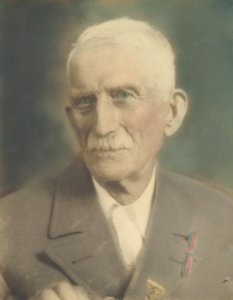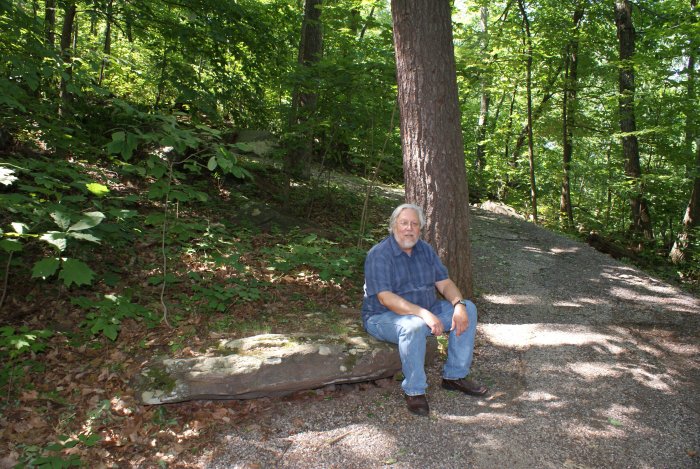|
Isaac Henry Tate By Steven R. Butler, Ph.D. Isaac H. Tate in the Civil War: Introduction and Commentary
The Civil War lasted almost exactly four years, from April 1961 to April 1865. Altogether, Isaac H. Tate served roughly half that time. His first enlistment, in 1862, was the shortest--from four to six months. His second term of service, from 1863 to 1864, lasted about a year and eight months--but although short in duration, it was an eventful period, during which time he took part in the following engagements, some of which were of major importance:
At this point, I would like to interject some personal commentary. In his so-called "cornerstone speech," made on March 21, 1861, Confederate Vice-President Alexander Stephens made it perfectly clear what the South stood for: "Our new government was founded, its foundations are laid, [and] its cornerstone rests upon the great truth that the Negro is not equal to the white man. That slavery, submission to a superior race, is his natural and normal condition. This is our new government." Stephens also said: "It is the first [government] in the history of the world based on this great physical, philosophical and moral truth." In view of Vice-President Stephens' remarks, and similar statements made by other Confederate leaders, I feel compelled to inform my readers that although there was once a time when I took pride in my great-grandfather's service, now that I am older and better informed I can no longer in good conscience do so. In truth, I am a little embarrassed by it and sincerely wish that I had more forebears like the single soldier on my mother's side of the family who fought for the Union, which history has very clearly shown to be the right side in this great national struggle. I likewise regret any earlier words or actions on my part that were indicative of pride in my great-grandfather's Confederate service. My only defense is that when I said or wrote or did those things, such as joining the Sons of Confederate Veterans (an organization from which I have since resigned), I was either young, na´ve, ill-informed, or unwilling to face the facts. I do not doubt that my great-grandfather Tate, if he could know my sentiments, would almost certainly be either angry or disappointed in me because I also do not doubt that he honestly believed that what he and a million other men fought for, namely the independence of the Southern states, was a noble cause. Perhaps if the stain of slavery and the degradation of nearly four million African-Americans did not taint that cause and render it ignoble, I would not feel the way I do. However, as historian James M. McPherson has written: "White supremacy and the right of property in slaves were at the core of the ideology for which Confederate soldiers fought." The truth of this statement is supported by the words of Col. William C. Oates, under whose leadership young Isaac H. Tate served during the Civil War. "The apprehension those poor men had of the consequences of the emancipation of four million of negro slaves in their midst," wrote Oates, "and they to be given the franchise and elevated to political and social equality with the whites, was horrifying to their proud spirits, and those who never owned a slave fought for slavery to avoid such direful consequences," adding: "Southern pride was offended and the blood made to boil at the idea of enforced equality of an inferior race." Does this mean that I think my great-grandfather was a bad man? No, I do not. If anything, I feel sorry for him because I believe that he was grievously misused, in the very same way that later generations of young men were misled into believing that preventing Vietnam from being reunited under a Communist government was essential to the national security of the United States or that Saddam Hussein somehow had something to do with 9/11 and that Iraq actually harbored "weapons of mass destruction." My remarks should not be considered disparagement of the soldiers who fought for all these reasons. There is no question that for the most part they were as brave and determined and honorable as any soldiers who served in any war. I do not vilify the soldiers but rather the ill-designing men who deceived not only those young men but also a goodly portion of the civilian populace. From all appearances, my great-grandfather was a well-intended individual who owing to his youth and probable lack of formal education (there were no public schools in the South in the early nineteenth century), was incapable of comprehending that by defending a government founded upon white supremacy and the perpetuation of African slavery, he was on the wrong side of history. No doubt he believed, as he was almost certainly told by all the adults around him, that he and his fellow Confederate soldiers were fighting for Southern independence in order to preserve the region's unique "way of life"--a euphemism for what many Southerners referred to as their "beneficent and patriarchal system of African slavery." Raised in a region in which the notion of white supremacy held sway over the minds of the masses, Private Tate was almost certainly unbothered by the fact that if he and his comrades somehow achieved a lasting Southern independence, the degradation, humiliation, and enslavement of four million of their fellow human beings, whose only crime was the color of their skin, would continue into an uncertain future. It is likewise doubtful that he and his fellow Confederate soldiers comprehended that they were the unwitting pawns of the wealthy planter class, who thanks to their control over Southern politics took unfair advantage of these mostly unschooled, obedient young men, using them to protect their own immoral and selfish interests. It is a matter of public record that on the eve of the Civil War some seventy-five percent of Southerners lived in non-slaveholding families, yet poor whites, kept in ignorance by slaveholding politicians who refused to support a system of public schools, willingly "joined the colors"--as did my great-grandfather--to fight what was essentially a rich man's war. Only a few former Confederates, such as General James Longstreet, later realized or regretted their mistake. Most, I believe, were either incapable or unwilling to confront the truth, which is entirely understandable. It is hard enough to be on the losing side; it is harder still to accept that you were sent on a fool's errand, which explains why so many former Confederates like my great-grandfather never abandoned the notion that the "Lost Cause," for which they risked their lives and for which a quarter of a million Southerners actually lost their lives, was a just and righteous endeavor, when in fact it was the very opposite. All this being said, my disapproval of the cause for which my great-grandfather fought has not prevented me from learning all I can about his experiences in what is undoubtedly one of the most signficant events in American history, nor has it stopped me visiting the places where his experiences took place. After all, I am a historian. In 2000 and again in 2012, I visited the Gettysburg Battlefield (and climbed Big Round Top both times). In 2010 I visited the Chickamauga Battlefield and in 2012 I went to see The Wilderness Battlefield, where my ancestor received the wound, which although painful and potentially dangerous, may have saved his life by removing him from harm's way, thus enabling him, instead of dying on some battlefield, to survive to a ripe old age.
Continue to: Isaac H. Tate in the Civil War, Part One: 1862 Photograph of Isaac H. Tate in old age (above), from author's personal collection.
This website copyright © 1996-2011 by Steven R. Butler, Ph.D. All rights reserved. |


 Although in later life Isaac H. Tate readily shared stories of his Civil War service with fellow veterans, he unfortunately said very little about it to members of his family and regrettably, the only written record he left to his descendants consists of a scrap of paper on which he used a pencil to write the dates of his enlistment and a list of the principal battles in which he participated-perhaps when he was preparing to apply for a Confederate pension and needed to refresh his memory. Consequently, the following account of his service has been reconstructed principally from information found in his military service record on file in the National Archives in Washington, D.C., Confederate muster rolls also preserved in the National Archives, and his Confederate Pension file in the state archives at Austin, Texas. This account also draws heavily on two postwar reminiscences, The War Between the Union and the Confederacy, authored by Colonel William C. Oates, who commanded the Fifteenth Alabama Regiment in 1863-1864, and Some Events and Incidents During the Civil War by William C. Jordan, an enlisted man who served in Company B, Fifteenth Alabama Regiment. The result is an account that is not very personal in nature but at least gives us some idea of what Isaac Tate experienced during this critical period in American history. Unless and until some hitherto unknown letters or journal turns up, which seems unlikely to happen, this then will have to do.
Although in later life Isaac H. Tate readily shared stories of his Civil War service with fellow veterans, he unfortunately said very little about it to members of his family and regrettably, the only written record he left to his descendants consists of a scrap of paper on which he used a pencil to write the dates of his enlistment and a list of the principal battles in which he participated-perhaps when he was preparing to apply for a Confederate pension and needed to refresh his memory. Consequently, the following account of his service has been reconstructed principally from information found in his military service record on file in the National Archives in Washington, D.C., Confederate muster rolls also preserved in the National Archives, and his Confederate Pension file in the state archives at Austin, Texas. This account also draws heavily on two postwar reminiscences, The War Between the Union and the Confederacy, authored by Colonel William C. Oates, who commanded the Fifteenth Alabama Regiment in 1863-1864, and Some Events and Incidents During the Civil War by William C. Jordan, an enlisted man who served in Company B, Fifteenth Alabama Regiment. The result is an account that is not very personal in nature but at least gives us some idea of what Isaac Tate experienced during this critical period in American history. Unless and until some hitherto unknown letters or journal turns up, which seems unlikely to happen, this then will have to do.